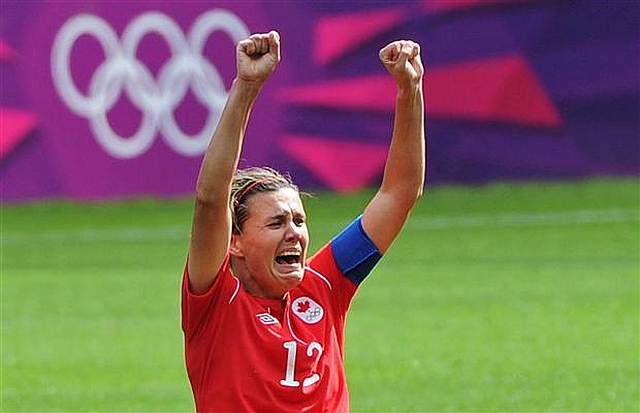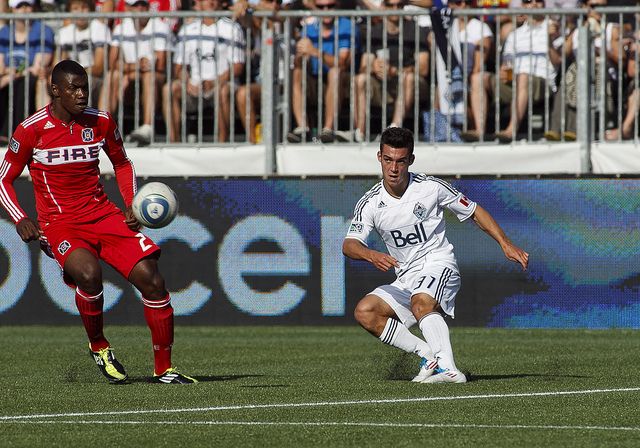When it looked like all the joy had gone, the Canadian national women’s team got a win that will light up soccer in the country for years to come.
In this Olympic tournament. Canada have shone when they are confident and full of belief, moving the ball from the back and carrying on in the face of adversity. This was not one of those times.
It was hoped that this bronze-medal match against France would be more promising than the last time they met: a devastating 4-0 loss in the 2011 Women’s World Cup. That got more intense after the team got so close to silver against the US, drawing attention across the country.
But those prospects looked really bleak in the first half. Playing their fourth game in ten days, Canada were exhausted by being constantly on the back foot. Distribution is so key in the Canadian game; even if chances aren’t coming together, getting the ball through midfield and holding possession takes pressure off the defense. But by the closing stages of the half, Canada were too tired to get the ball forward, beyond hoofing it to a single player, then being easily closed down without any support. This made it harder on the defense, who had even more pressure heaped upon them.
There was no transformative change at the half-time interval. France became more dangerous, turning offensive possession into lethal, lethal chances. There were almost too many to count. Four players had four shots or more, which what all of Canada together were able to put together. Substitute Eugenie Le Sommer got five in thirty minutes. A shot hit the crossbar, a shot hit the goal post, and then France had four consecutive shots from around 20 yards that sailed just wide over the course 12 minutes. Lauren Sesselmann, trying to win the ball on the ground, conceded an indirect free kick in the area by seizing the ball between her knees and trying to walk away with it, which was only funny because it was terrifying and nothing came of it. Camille Abily cannot imagine what might have been.
Canada did just not look like they could create anything. They had heroic defensive performances from Erin McLeod and Desiree Scott, the former who was incredibly organized on balls coming into the area, the latter who cleared a ball off the line with ten minutes left. But it wasn’t a cautious, confident game. Canada were desperate. We did not see the strength from players that were defensive dynamos in earlier games, and it’s their service that powers the offensive-minded Sinclair and Tancredi. It is absolutely amazing to think that with fifteen minutes left, Canada trailed 18-2 in shots and yet only 53-47% in possession, because it clashes so fiercely with their inability to close down and clear the ball.
Christine Sinclair, for her part, did her best as a provider, getting up the midfield and sending balls forward, but Canada just had nothing going forward to hold up the ball once it got there. With ten minutes left, it became as difficult to see them creating anything as it was to see them being able to run from France for another thirty minutes.
And then.
I have spoken earlier about Canada’s belief being their greatest power. I hoped desperately that it would return at the half, and it didn’t. But somehow, in the very last minute of regular time, something changed. All of a sudden, the ball got forward. Canada were attacking from wide areas. Christine Sinclair was fouled just outside the box, and Diana Matheson’s free kick was directed just wide by Kaylyn Kyle. It seemed as though that would be that, and then Canada returned for another try.
Take a look at it. Sesselmann at halfway lays it off for Schmidt in the centre, who carries it up the field and lays a perfectly weighted slow-rolling ball back for the defender wide on the left. Sinclair bails out Sesselmann, who has got Corine Franco hot on her heels. (If Franco had got even a bit further forward to touch Schmidt’s pass, she could have ended it all early.) Sinclair plays it around the edge of the area to Schmidt. Schmidt is dispossessed and it dribbles out to Matheson at thirty yards. Matheson returns it, and Schmidt’s deflected shot falls right back to Canada’s third-most capped player, now wide-open on the right. She buries it with her first touch.
It was Canada’s only shot on target in the game. It was Matheson’s only goal in the tournament. It was the only one that mattered.
It is so appropriate that this team, with inexhaustible chemistry and unbreakable friendship, succeeded ultimately through a movement of four players, three of which sent and received passes from each other. It was so appropriate that the goal came from ever-reliable Matheson. It was so appropriate that she was supplied by Schmidt, who replaced her in this game as the country’s record holder for consecutive appearences. It was so appropriate that this team, disappointed so thoroughly at the last possible moment in the semifinal, mustered their efforts at that exact moment in this game.
It is Canada’s only medal in team sports (CTV have been using the metric of traditional team sports, whose methodology I cannot readily explain) in 76 years. It is Canada’s only medal in soccer since Galt FC won men’s gold in 1904. It, and the WNT’s Pan-Am Games win in 2011, are the only serious hardware for Canada in 12 years, and the only serious hardware in a non-regional tournament since that Olympic win 98 years ago.
The Canadian national women’s team have marked their place in history and the hearts of Canadians across the country, who are offering their unreserved jubilation at this success in Coventry. They did not dominate. They did not blind anyone with silky skills.
But they believed, and so they won none the less. And they have taken their place among the world’s best as a result.




